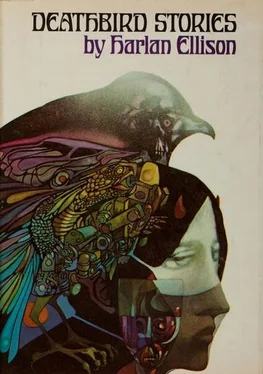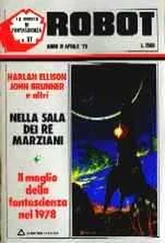He fought consciousness, as if on some cellular level he knew what pain awaited him with the return of his senses. But the red tide washed higher, swallowed more and more of his deliquescent body, and finally the pain thundered in from the blood-sea, broke in a long, curling comber and coenesthesia was upon him totally. He screamed and the scream went on and on for a long time, till they came back to him and gave him an injection of something that thinned the pain, and he lost contact with the chaos that had been his right foot.
When he came back again, it was dark and at first he thought it was night; but when he opened his eyes it was still dark. His right foot itched mercilessly. He went back to sleep, no coma, sleep.
When he came back again, it was still night and he opened his eyes and he realized he was blind. He felt straw under his left hand and knew he was on a pallet and knew he had been captured; and then he started to cry because he knew, without even reaching down to find out, that they had amputated his foot. Perhaps his entire leg. He cried about not being able to run down in the car for a pint of half-and-half just before dinner; he cried about not being able to go out to a movie without people trying not to see what had happened to him; he cried about Teresa and what she would have to decide now; he cried about the way clothes would look on him; he cried about the things he would have to say every time; he cried about shoes; and so many other things. He cursed his parents and his patrol and the hostiles and the men who had sent him here and he wanted, wished, prayed desperately that anyone of them could change places with him. And when he was long finished crying, and simply wanted to die, they came for him, and took him to a hooch where they began questioning him. In the night. The night he carried with him.
They were an ancient people, with a heritage of enslavement, and so for them anguish had less meaning than the thinnest whisper of crimson cloud high above a desert planet of the farthest star in the sky. But they knew the uses to which anguish could be put, and for them there was no evil in doing so: for a people with a heritage of enslavement, evil is a concept of those who forged the shackles, not those who wore them. In the name of freedom, no monstrousness is too great.
So they tortured Lestig, and he told them what they wanted to know. Every scrap of information he knew. Locations and movements and plans and defenses and the troop strength and the sophistication of armaments and the nature of his mission and rumors he’d picked up and his name and his rank and every serial number he could think of, and the street address of his home in Kansas, and the sequence of his driver’s license, and his gas credit card number and the telephone number of Teresa. He told them everything.
As if it were a reward for having held nothing back, a gummed gold star placed beside his chalked name on a blackboard in a kindergarten schoolroom, his eyesight began to come back slightly. Flickering, through a haze of gray; just enough light permitted through to show him shapes, the change from daylight to darkness; and it grew stronger, till he could actually see for whole minutes at a time…then blindness again. His sight came and went, and when they realized he could see them, they resumed the interrogations on a more strenuous level. But he had nothing left to tell; he had emptied himself.
But they kept at him. They threatened to hammer bamboo slivers into his damaged eyeballs. They hung him up on a shoulder-high wooden wall, his arms behind him, circulation cut off, weight pulling the arms from their shoulder sockets, and they beat him across the belly with lengths of bamboo, with bojitsu sticks. He could not even cry any more. They had given him no food and no water and he could not manufacture tears. But his breath came in deep, husking spasms from his chest, and one of the interrogators made the mistake of stepping forward to grab Lestig’s head by the hair, yanking it up, leaning in close to ask another question, and Lestig—falling falling—exhaled deeply, struggling to live; and there was that breath, and a terrible thing happened.
When the reconnaissance patrol from the firebase actualized control of the hostile command position, when the Huey choppers dropped into the clearing, they advised Supermart HQ that every hostile but one in the immediate area was dead, that a Marine Lance Corporal named Lestig, Vernon C. 526-90-5416, had been found lying unconscious on the dirt floor of a hooch containing the bodies of nine enemy officers who had died horribly, most peculiarly, sickeningly, you’ve gotta see what this place looks like, HQ, jesus you ain’t gonna believe what it smells like in here, you gotta see what these slopes look like, it musta been some terrible disease that could of done this kinda thing to ‘em, the new Lieutenant got really sick an’ puked and what do you want us to do with the one guy that crawled off into the bushes before it got him, his face is melting, and the troops’re scared shitless and…
And they pulled the recon group out immediately and sent in the Intelligence section, who sealed the area with Top Security, and they found out from the one with the rotting face—just before he died—that Lestig had talked, and they medivacked Lestig back to a field hospital and then to Saigon and then to Tokyo and then to San Diego and they decided to court-martial him for treason and conspiring with the enemy, and the case made the papers big, and the court-martial was held behind closed doors and after a long time Lestig emerged with an honorable and they paid him off for the loss of his foot and the blindness and he went back to the hospital for eleven months and in a way regained his sight, though he had to wear smoked glasses.
And then he went home to Kansas.
Between Syracuse and Garden City, sitting close to the coach window, staring out through the film of roadbed filth, Lestig watched the ghost image of the train he rode superimposed over flatland Kansas slipping past outside. The mud-swollen Arkansas River was a thick, brown underline to the horizon.
“Hey, you Corporal Lestig?”
Vernon Lestig refocused his eyes and saw the wraith in the window. He turned and the sandwich butcher with his tray of candy bars, soft drinks, ham&cheese on white or rye, newspapers and Reader’s Digests, suspended from his chest by a strap around the neck, was looking at him.
“No thanks,” Lestig said, refusing the merchandise.
“No, hey, really, aren’t you that Corporal Lestig—” He uncurled a newspaper from the roll in the tray and opened it quickly. “Yeah, sure, here you are. See?”
Lestig had seen most of the newspaper coverage, but this was local, Wichita. He fumbled for change. “How much?”
“Ten cents.” There was a surprised look on the butcher’s face, but it washed down into a smile as he said, understanding it, “You been out of touch in the service, didn’t even remember what a paper cost, huh?”
Lestig gave him two nickels and turned abruptly to the window, folding the paper back. He read the article. It was a stone. There was a note referring to an editorial, and he turned to that page and read it. People were outraged, it said. Enough secret trials, it said. We must face up to our war crimes, it said. The effrontery of the military and the government, it said. Coddling, even ennobling traitors and killers, it said. He let the newspaper slide out of his hands. It clung to his lap for a moment then fell apart to the floor.
“I didn’t say it before, but they should of shot you, you want my opinion!” The butcher said it, going fast, fast through the aisle, coming back the other way, gaining the end of the car and gone. Lestig did not turn around. Even wearing the smoked glasses to protect his damaged eyes, he could see too clearly. He thought about the months of blindness, and wondered again what had happened in that hooch, and considered how much better off he might be if he were still blind.
Читать дальше












